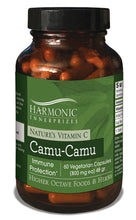 Natural food components are much more available to the body than the synthetically processed vitamins that are common to most dietary supplements. A chemist may tell you that a synthetic molecule that is identical to a natural molecule will perform identically in the body. In reality, the natural molecule is attached to scores of other molecules that participate in its action within the body.*
Natural food components are much more available to the body than the synthetically processed vitamins that are common to most dietary supplements. A chemist may tell you that a synthetic molecule that is identical to a natural molecule will perform identically in the body. In reality, the natural molecule is attached to scores of other molecules that participate in its action within the body.*
The Importance of Vitamin C
Nutritionists believe that ascorbic acid by itself is not vitamin C. It is only ascorbic acid, one component of an entire vitamin C complex. As a result, vitamin C is often misunderstood. Unfortunately, back in the 1930s when Recommended Daily Allowances were established, government scientists decided that vitamin C should be rated according to the amount of ascorbic acid it contains. Ascorbic acid became the marker, ignoring all the other nutritional bonds ascorbic acid is attached to. In nature, ascorbic acid is an antioxidant that preserves and protects the vitamin C complex. To synthesize ascorbic acid without its other components, in our opinion, was a mistake.
The vitamin C complex found in nature consists of enzymes, bioflavonoids and scores of other components that are collectively referred to as the P factor. These P factors serve the body in numerous other ways besides antioxidant activity. The P factors support the vascular system.* They make the vessels tougher and more durable.* They improve the integrity of the capillaries.*
The Importance of Vitamin K
Vitamin K is another part of the vitamin C complex. Other components of the C complex increase the oxygen carrying capacity of the blood.* This is extremely significant as oxygen is probably the one essential nutrient we absolutely cannot live without.
The Importance of Enzymes
As previously mentioned, the natural C complex contains enzymes, the most significant being tyrosinase. It also contains copper which is a cofactor in several enzyme systems in the body. It is a catalyst in the creation of hemoglobin in red blood cells and synergistically assists vitamin C in collagen and elastin formation, which supports the integrity of connective tissue.
Camu Camu Benefits
A complete vitamin C complex has much more nutritional value than synthesized ascorbic acid. Harmonic Innerprize’s Camu Camu All-Natural Vitamin C Complex is the way nature intended vitamin C to be delivered into the body. These camu camu capsules are complimented in a base by two other highly concentrated vitamin C fruits: amla fruit from India and goji berries from Tibet. Monatrace™ minerals energetically harmonize the formula.
Comparison Shop...Why We Believe Our Product is Better:We spent considerable time surfing the net and checking health food stores, and we found that most of our competitors market their camu camu capsules and supplements by stating on the label the total amount of camu camu, rather than the amount of vitamin C contained. For example, they contain 500 mg or 350 mg of camu camu and either state the vitamin C potency as a percentage or not at all. At Harmonic Innerprizes, we claim 150 mg of vitamin C from camu camu. After all, we feel most camu camu benefits come from the vitamin C content. At first glance, some of these competitive products seem more cost effective as 500 mg looks like a better buy than 150 mg. Most commercially available camu camu extracts have vitamin C concentrations between 10% and 20%. When you do the math—assuming the maximum vitamin C potency is 20%—(500 mg x 20%), you only have 100mg of natural vitamin C. Please study our supplement facts. We claim 150 mg of vitamin C. To get that amount of vitamin C, you need 750 mg of camu camu. You will also see that we have added other fruits also known for their vitamin C content and antioxidant properties for a more complete, synergistic effect to the formula.* The total weight of one capsule is 810 mg, yielding 150 mg of natural vitamin C. If you take the time and do the math on competing products, you will find our camu camu capsules are a true value. |







